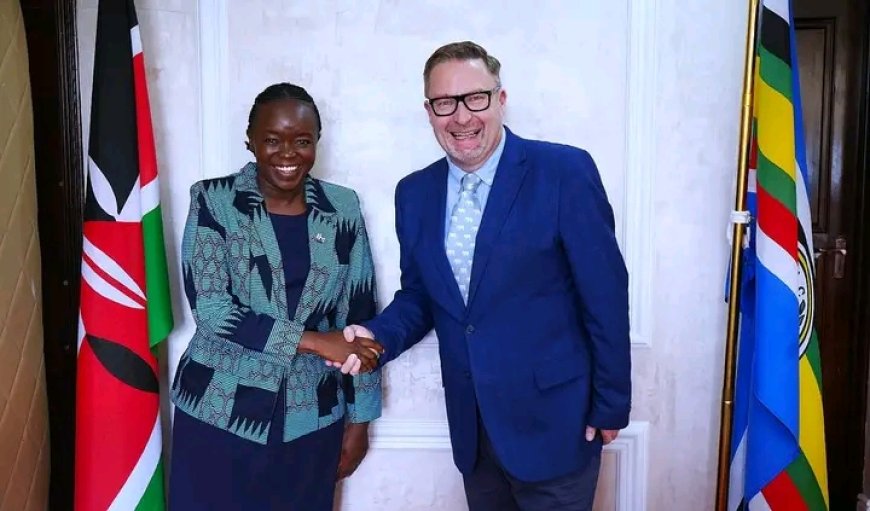Strengthening Maternal and Newborn Health in Kenya: A new era of Emergency Referral systems

Nairobi,
Friday, 29 November, 2024
McCreadie Andias
In a significant step toward improving maternal and newborn health across Kenya, Dr. Deborah M. Barasa, the Cabinet Secretary for Health engaged with Lee Walls, the Global Head of m-mama, to discuss the expansion of an innovative emergency referral system aimed at reducing maternal and neonatal mortality.
This partnership represents a promising effort to address one of the most pressing healthcare challenges in the country.
Kenya has made strides in improving healthcare access, but maternal and neonatal mortality rates remain a significant concern.
The latest initiative, backed by the Ministry of Health, seeks to eliminate delays in the transport and referral of mothers and newborns to health facilities—delays that can often prove fatal.
The new system, based on the m-mama model, is designed to ensure that no mother or newborn faces obstacles in accessing timely care during emergencies.
The Power of m-mama: A Community-Based Solution
m-mama, a groundbreaking community-based transport solution, has already proven its value in addressing the critical "second delay" in healthcare services—the time it takes for patients to get from their home to the hospital after emergency care is identified.
This delay has long been a major contributor to maternal and neonatal deaths, particularly in rural and underserved areas.
m-mama uses mobile phones to connect pregnant women and new mothers in need of emergency transport to drivers in the community who are trained to deliver safe, prompt, and efficient transportation to the nearest health facility.
The success of m-mama is already visible in several countries where the system has been implemented, showing dramatic reductions in both maternal and neonatal deaths. By leveraging local knowledge and resources, m-mama has bridged the gap between remote communities and essential healthcare services.
Through a simple phone call, pregnant women in labor or women with newborns in distress can access immediate transportation to the nearest hospital or healthcare center.
Kenya, with its diverse geographic and socio-economic landscape, faces unique challenges in healthcare delivery. While major urban centers have robust healthcare systems, rural areas often lack the infrastructure and resources needed to respond to maternal and neonatal emergencies quickly.
m-mama’s integration into Kenya’s healthcare system could be a game-changer, offering a solution that is both cost-effective and scalable.
A National Solution for a National Crisis
The Ministry of Health has been vocal about its commitment to reducing maternal mortality in the country, with an emphasis on ensuring that every mother and child can reach healthcare facilities without delay.
The adoption of m-mama’s model into Kenya’s healthcare system is part of a broader strategy to tackle maternal health challenges head-on. Dr. Barasa emphasized that the partnership with m-mama would be instrumental in saving lives, particularly in counties where maternal mortality rates remain alarmingly high.
While m-mama’s initial focus was on providing transport for emergencies, the potential impact extends far beyond just transportation. The system also improves communication between communities and health services, enhances coordination among healthcare providers, and ultimately helps reduce preventable deaths by ensuring that women and children receive timely and appropriate care.
To make this vision a reality, the Ministry of Health plans to adapt the m-mama model to fit the specific needs of various counties across the country.
By utilizing data-driven strategies and adapting the solution to local contexts, Kenya aims to create a robust referral network that can respond effectively to maternal and neonatal emergencies in even the most remote areas.
The partnership also reflects a growing global awareness of the importance of community-based solutions in tackling public health challenges.
The m-mama initiative has already proven its worth in countries like Uganda and Zambia, where it has saved countless lives by providing timely access to healthcare. Kenya is now positioning itself to replicate this success on a national scale.
As the Kenyan government continues to strengthen its healthcare system and address the gaps in maternal and newborn health services, the adoption of m-mama stands out as a vital step forward.
Through this partnership, Kenya hopes not only to reduce mortality rates but to also empower local communities to take ownership of their health, ultimately fostering a stronger, more resilient healthcare system for future generations.
What's Your Reaction?



































































































































































































































































































